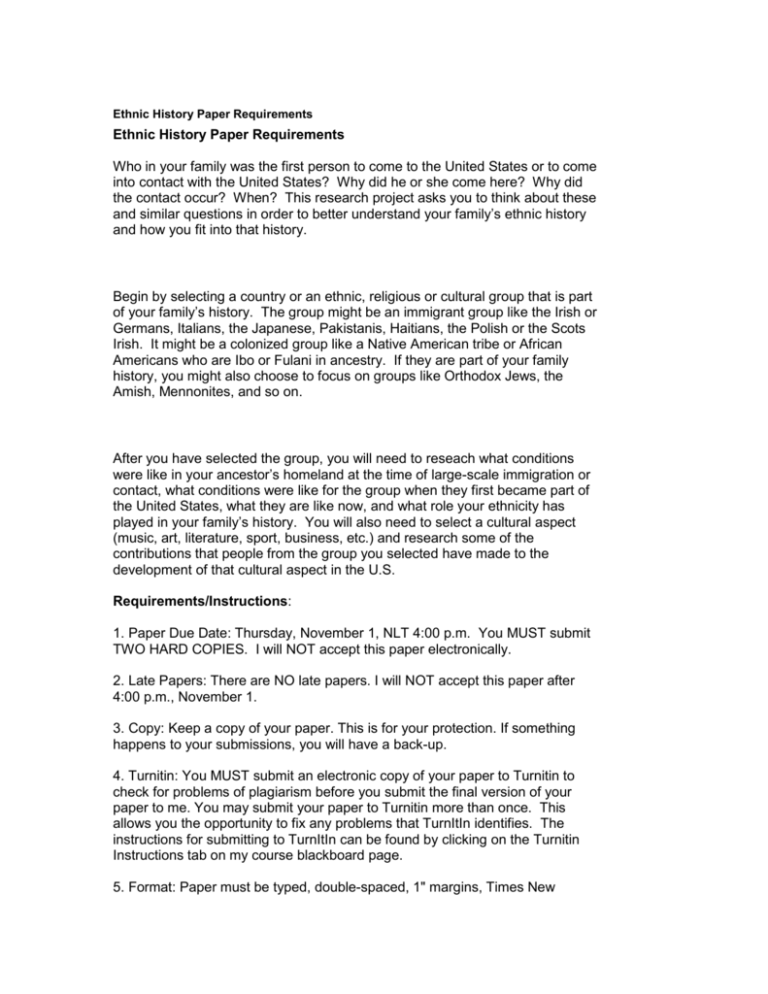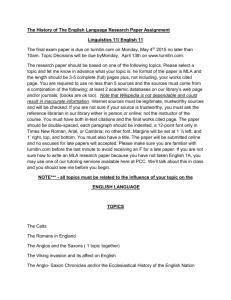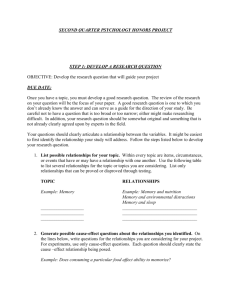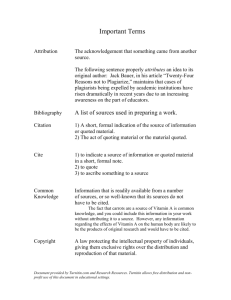Ethnic History Paper Requirements - Alfred State College intranet site
advertisement

Ethnic History Paper Requirements Ethnic History Paper Requirements Who in your family was the first person to come to the United States or to come into contact with the United States? Why did he or she come here? Why did the contact occur? When? This research project asks you to think about these and similar questions in order to better understand your family’s ethnic history and how you fit into that history. Begin by selecting a country or an ethnic, religious or cultural group that is part of your family’s history. The group might be an immigrant group like the Irish or Germans, Italians, the Japanese, Pakistanis, Haitians, the Polish or the Scots Irish. It might be a colonized group like a Native American tribe or African Americans who are Ibo or Fulani in ancestry. If they are part of your family history, you might also choose to focus on groups like Orthodox Jews, the Amish, Mennonites, and so on. After you have selected the group, you will need to reseach what conditions were like in your ancestor’s homeland at the time of large-scale immigration or contact, what conditions were like for the group when they first became part of the United States, what they are like now, and what role your ethnicity has played in your family’s history. You will also need to select a cultural aspect (music, art, literature, sport, business, etc.) and research some of the contributions that people from the group you selected have made to the development of that cultural aspect in the U.S. Requirements/Instructions: 1. Paper Due Date: Thursday, November 1, NLT 4:00 p.m. You MUST submit TWO HARD COPIES. I will NOT accept this paper electronically. 2. Late Papers: There are NO late papers. I will NOT accept this paper after 4:00 p.m., November 1. 3. Copy: Keep a copy of your paper. This is for your protection. If something happens to your submissions, you will have a back-up. 4. Turnitin: You MUST submit an electronic copy of your paper to Turnitin to check for problems of plagiarism before you submit the final version of your paper to me. You may submit your paper to Turnitin more than once. This allows you the opportunity to fix any problems that TurnItIn identifies. The instructions for submitting to TurnItIn can be found by clicking on the Turnitin Instructions tab on my course blackboard page. 5. Format: Paper must be typed, double-spaced, 1" margins, Times New Roman font, type size 12. 6. Cover: Do NOT use a plastic cover or a folder for the paper. 7. Length: Paper length - 10 pages! I will stop reading at the end of 10 pages! 8. Value: This paper is worth 100 points (the equivalent of one unit test). 9. Organization: You must follow the organizational model I describe below. If you do not, your grade will be substantially lowered. 10. Writing: A good paper must be well-written. Grammar, spelling, tenses, paragraphing, and punctuation are as important as content. Readers simply do not pay much attention to good content if it is not also well-written. In the past, I have given papers with excellent content poor grades because of the quality of the writing. 11. Do not plagiarize. You must do your own work and writing on this paper. If I find you have plagiarized, the minimum penalty you will receive is a zero on this assignment. Depending on the seriousness of the infraction, I may pursue more serious penalties. If you have any questions about what plagiarism is, see me. Organization of Paper: TITLE PAGE (does not count as a content page): Title page with the following information: Ethnic History Paper Name of the Group You Selected Minority Cultures Section 1 or 2 November 1, 2007 PAPER BODY: The body of the paper has five parts. Label each part (Part I., Part II., and so on). LIST OF REFERENCES (does not count as a content page): 1. 2. 3. 4. Use APA format (See Citations and List of References below). You must have a minimum of seven references. One of your references may be your text book. At least four of your references must come from professional journals and books (not counting your text, if you choose to use it) and not from popular media sources like magazines or newspapers. 5. You may use internet sources but at least three of your sources must not be electronic. Parts of the Paper Body Part I. Homeland. At the time of large scale first immigration or first contact, discuss the government, religion, culture, economy, and life style of the country or place where the group you have chosen originated. If the group you selected was an immigrant group, what push and pull factors existed? If your group is a colonized group, how was the group incorporated into the U.S.? Approximate length – 2/3 pages. Part II. Arrival in the U.S. How was your group treated when it came to or became part of the United States? What jobs or employment were open to them? Where did they settle or where did they live? What resources did they bring with them or have? If members of the group experienced prejudice and discrimination, how did they respond? Approximate length - 2 pages. Part III. The U.S. today. Describe the basic demographics of the group you have chosen (numbers, occupation, income, education, residence, age and sex distribution, poverty rate, and so on). What challenges face the group you have selected today? Approximate length – 2/3 pages. Part IV. Cultural Aspect. Turn your attention to ONE aspect of your heritage that interests you the most. For example, you might look at a sport, music, dance, literature, art, crime, or business. Discuss some of the influences that members of the group you have chosen have had on the development of that aspect in the U.S. You might also include mention of some group members notable for their achievements in the area you have selected. Approximate length – 2/3 pages. Part V. What is your family’s attitude towards its heritage? Is your ethnic or cultural past something that is a part of your family life in general? Do you feel connected to this ethnic or cultural heritage always, sometimes, never? Are there stereotypes that exist about this ethnicity/culture? What are they? Have you ever been affected by them? You might include a summary of a interview with a family member here who belongs to an older generation that do you. Approximate length - 1 page. CITATIONS and LIST OF REFERENCES: Use APA (American Psychological Association) format. If you don’t know how to use it yet, you should learn. It is one of the major ways of formatting in the social sciences. There are many places to go to learn the basics. While you may consult me, it probably would be better to go to the library or to an APA website. While there are many APA usage websites, one you might use is below: http://www.vanguard.edu/faculty/ddegelman/index.aspx?doc_id=796 Advice: 1. Begin on this assignment as quickly as you can. A good way to cause yourself major trouble with this assignment is to wait until the last minute to work on it. More than anything else, this assignments requires careful thought and careful research on your part. 2. I suggest that you learn the basics of APA formatting before you begin to do your research. You will need specific bibliographic and citation information and you want to make sure that you collect what you need. 3. Use the Hinkle library. I have discussed this assignment with library staff and they have several excellent resources that you might choose to use as you work on this paper. 4. If writing is not your strong point, I would start early, revise often, and have others edit the paper. For goodness sakes, watch your spelling. 5. If you have questions as you work on the assignment, I will be happy to try to answer them. However, if you wait until the last minute, I may not have the time to help you. In other words, do not procrastinate! Grading: You will be graded on the following: 1. Instructions: Did you follow them? 2. Writing: Is your writing college-level? I will be looking for the number of mistakes in such things as spelling, grammar, paragraphing, and capitalization. 3. Content: Are your sections accurate, thorough and well-organized? Michael Cobb Chair Social and Behavioral Sciences




